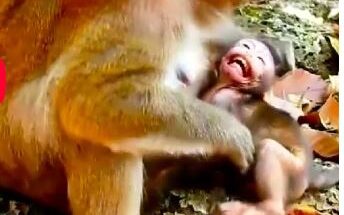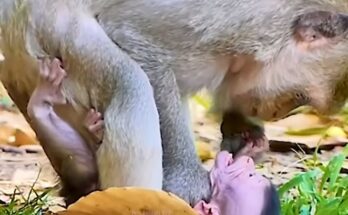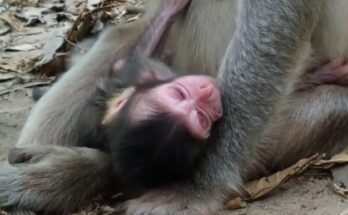In the heart of the dense jungle, where sunlight filters through thick leaves and vines twist like serpents, Mother Monkey sits on a sturdy branch, her brow furrowed with concern. Her baby, a tiny ball of energy with bright eyes and a mischievous grin, swings wildly from tree to tree, paying no mind to the dangers lurking around them. While other mother monkeys watch their little ones carefully practicing safe jumps or learning to forage under close supervision, Mother Monkey’s baby seems determined to do the opposite—always seeking trouble, always pushing limits.
It’s not that Mother Monkey doesn’t love her baby. In fact, she adores him more than anything else in the world. But her worry runs deep, rooted in the knowledge of how dangerous the jungle truly is. Every rustling leaf could hide a predator. Every slippery branch could mean a deadly fall. Her baby monkey, however, is blissfully unaware of these threats. His playful nature drives him to steal bananas from nearby groups, tug the tails of older monkeys, and dart away before anyone can scold him. He’s fearless, yes, but also reckless.
Mother Monkey’s unhappiness stems from more than just exhaustion; it comes from fear. She knows that as much as she tries to protect him, there are limits to what she can control. Other mothers have noticed her baby’s unruly behavior, and sometimes they give her disapproving looks. “Why can’t she keep him in line?” they seem to wonder. It hurts her, because she feels responsible not only for his safety but also for how others perceive him—and, by extension, her.
Another layer of her concern lies in the lessons he seems unwilling to learn. While the other young monkeys watch and imitate their mothers—carefully selecting ripe fruits, grooming one another, moving cautiously—her baby doesn’t pay attention. He’s too busy inventing his own games, too busy chasing butterflies or jumping from higher branches than is wise. She worries he won’t develop the skills he needs to survive when he grows older, when she won’t be able to shield him anymore.
At night, when the jungle quiets and the stars peek through the canopy, Mother Monkey curls her tail around her sleeping baby, watching his tiny chest rise and fall. In these moments, her love feels almost overwhelming. She wishes she could bottle up his curiosity, his boundless energy, and somehow temper it with caution. But she also knows part of what makes him who he is—bright, adventurous, and full of life—is the very thing that terrifies her.
Still, deep down, she holds hope. Perhaps as he grows older, he’ll begin to understand the balance between playfulness and responsibility. Maybe the wisdom she tries to impart, even when it seems ignored, will eventually take root. Until then, Mother Monkey will continue to worry, not out of frustration, but out of fierce, unshakable love. It’s the burden—and the beauty—of being a mother in the wild.


